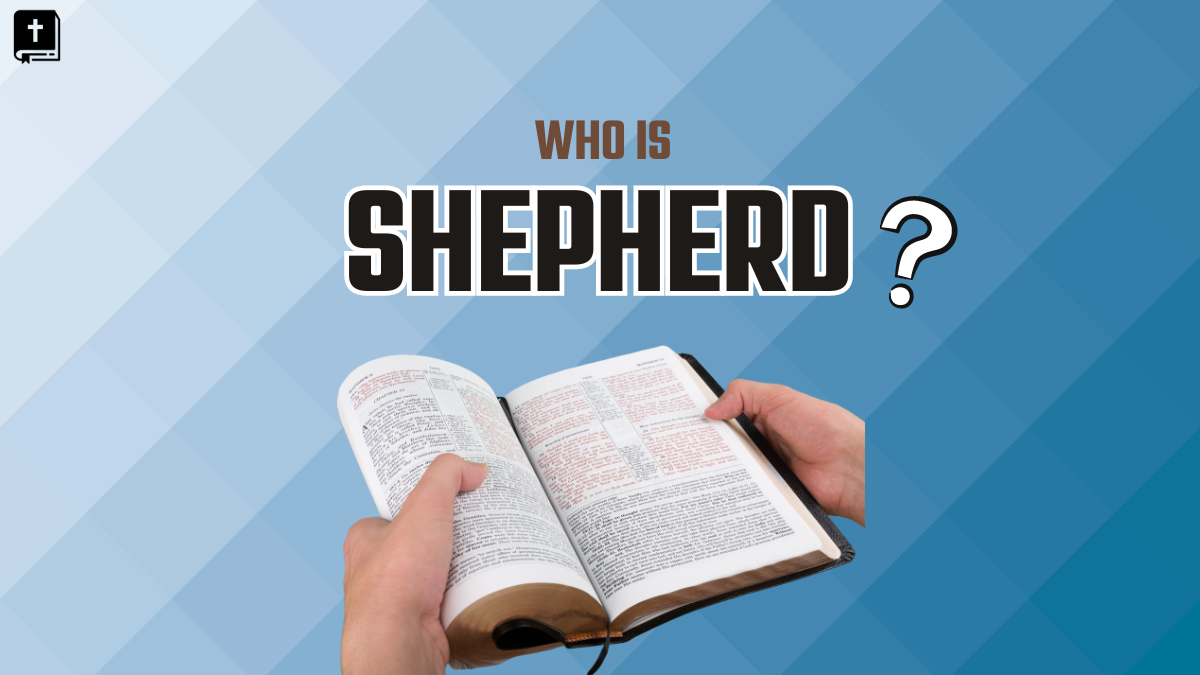Do you picture a shepherd as just someone who takes care of sheep, or is there more to it in the Bible? Who Is A Shepherd In The Bible? Let’s dive into the role of the shepherd in the Bible. They symbolize guidance, care, and protection. Biblical shepherds are key figures, ensuring the safety of their flocks and representing deep spiritual truths.
They show us what it means to guide, care for, and protect others. By looking into the lives of biblical shepherds like David and Jesus, we see the true meaning of being a shepherd. This role is vital in both the Old and New Testaments.
The Role of Shepherds in Biblical Times
In biblical times, shepherds played a key role in keeping communities alive and stable. They led their flocks to good pastures and water, making sure they were healthy. Their job went beyond just leading; they had to protect the sheep from dangers, showing great courage and alertness.
Shepherds used special tools for their work. They carried a rod for defense and a staff to guide the sheep. These tools showed their skill and authority in taking care of animals. Shepherding was often a family affair, with younger ones learning from the older ones. This way, important skills and traditions were passed down through generations.
The importance of shepherds in biblical times cannot be ignored. Families depended a lot on sheep for food, wool, and skins. This shows how crucial shepherding was to everyday life and the economy back then.
Significance of the Shepherd Motif in Scripture
The shepherd motif is a key theme in the Bible, showing deep spiritual messages across the Old and New Testaments. It highlights the caring nature of shepherds and their leadership and pastoral duties. In old times, shepherds were crucial, guiding, protecting, and feeding their flocks.
In the Old Testament, the shepherd theme points out leadership failures. God contrasts bad leaders with the ideal Good Shepherd. This shows the qualities of care, devotion, and guidance expected from leaders. The use of shepherd imagery stresses the need for leaders to protect and serve with integrity and compassion.
The New Testament adds more depth to this theme as Jesus calls Himself the Good Shepherd. His statement shows his deep commitment to His followers, including self-sacrifice and love. This shows how divine guidance relates to earthly leadership, highlighting the value of true care in leadership.
God being seen as a shepherd brings up themes of comfort, watchfulness, and support. This imagery shares a strong message about the close bond between God and His people. It reminds followers of God’s constant presence and watchfulness in their life’s journey.

Who Is A Shepherd In The Bible
In the Bible, being a shepherd is important both in real life and spiritually. Many figures in the Old Testament are seen as key Biblical shepherds. They show us what it means to lead and care for others.
Notable Shepherds in the Old Testament
Abel, Moses, and King David are some of the most famous Biblical shepherds. They guided their flocks, whether animals or people. David is especially notable for his deep bond with God, seen in Psalm 23. This shows how God guides and cares for us.
Characteristics of the Good Shepherd
The Bible clearly shows what makes a good shepherd. They deeply care for their flock, keeping them safe and fed. A shepherd must be honest and lead with love. Jesus is the ultimate example of this, showing us what it means to be a true shepherd. He gave his life for his followers.
These Biblical shepherds show us the qualities we need in leaders.
David: The Shepherd King
David the shepherd is known for becoming a king. His journey shows us what great leadership looks like. He learned important lessons from taking care of his sheep that he used in Psalm 23.
This Psalm shares key lessons from a shepherd king. It talks about guidance, trust, and God’s care for us.
Lessons from Psalm 23
David talks about trusting God in Psalm 23. He sees God as a shepherd, bringing peace and trust. This shows how a shepherd and a king both care for their people.
He talks about protection and comfort, showing what it means to lead with care. These ideas are important for leaders who want to build trust.
David’s Experience as a Shepherd
David’s early life as a shepherd shaped his future as a king. He learned about compassion and protecting his flock. These skills helped him become a good king.
He knew how to protect and trust his people, just like a shepherd. Psalm 23 shows how God guides us, just as a shepherd guides his sheep.
God as the Ultimate Shepherd
The Bible shows God as a shepherd, highlighting His deep care for His people. He guides His flock through life’s challenges. Scripture, from the Psalms to the Gospels, talks about His role in protecting and caring for believers.
God’s care shows in many ways, like guiding us to be righteous and protecting us from spiritual dangers. This care gives us peace and strength.
Scripture tells us about the strong bond between believers and God as their shepherd. His love builds trust and security in those who seek Him. Being part of His flock makes us feel important and valued.
This idea of God as a shepherd comforts us deeply. It shows the true meaning of divine care in the Bible.
Jesus: The Good Shepherd of the New Testament
In the New Testament, Jesus is called the Good Shepherd. This title shows His deep care for guiding and protecting His followers. He teaches us about His role as a caretaker and His readiness to sacrifice for us.
Through His teachings, Jesus shows the deep bond between Him and us. He uses stories to explain His relationship with humanity.
Jesus’ Parables of the Lost Sheep
The parables of lost sheep show how far Jesus will go to find and save the lost. Jesus tells stories of a shepherd who leaves ninety-nine sheep to find one that strayed. This shows us that every person is very important in God’s eyes.
These stories highlight Jesus’ compassion and the themes of redemption and grace in the New Testament. They show us the love and care of the Good Shepherd.
The Function of a Shepherd: Provision and Protection
Shepherds have important jobs that focus on provision and protection. They make sure their flock is well taken care of. They lead the sheep to good pastures and clean water. This means they often go through tough terrains to find the best places for the animals.
Protecting the flock is a key part of a shepherd’s job. They keep an eye out for dangers like predators. With tools like rods and staffs, they protect their sheep. This shows the strong bond between the shepherd and the sheep. It’s like the caring relationship God has with us, showing the balance between care and watchfulness in shepherding.
The image of shepherds reminds us of their two main goals. They work to meet the needs of their flock and keep them safe from harm. This shows how leaders should put the needs of their followers first.
Bad Shepherds and Their Consequences
The Bible warns us about bad shepherds and their harm to communities. It shows how poor leaders can mislead their followers, causing many problems. These stories teach us the dangers of bad leadership and the importance of honest guidance.
Examples of Bad Leadership in the Bible
Prophets like Ezekiel and Jeremiah talk about bad shepherds in their writings. These leaders care more about themselves than their people. This leads to big problems. They make their followers doubt and lose hope.
Jeremiah says God is upset with these leaders because they don’t take care of their people. The harm they cause doesn’t just happen now, but also affects future generations. It leaves a legacy of brokenness and division. These stories from the Bible still teach us today. They remind us that being responsible and ethical is key to leading well.
The Spiritual Implications of Shepherding
Shepherding in the Bible is more than just looking after sheep. It’s a deep metaphor for the duties of leaders in faith. These leaders must care for the spiritual needs of their followers. They do this through teaching, guiding, and offering moral support.
This approach to leadership means leaders must have a heart for service. They should aim to be like Jesus, the ultimate Good Shepherd. This view shows that leaders are meant to protect and guide their people.
Leaders in faith communities should grasp these spiritual lessons. By tending to their followers, they help build a strong spiritual bond. This bond is based on faith and shared values.
Shepherding as a Metaphor for Leadership
The shepherding metaphor is a deep look at leadership in the Bible. It highlights the importance of responsibility, service, and being accountable. Leaders are seen as more than just figures at the top. They are like shepherds, guiding and protecting their flock.
This metaphor shows that good leaders are compassionate and want to help their community. They care deeply for those they lead.
Looking at pastoral care, we see that great leaders put their people first. They make sure every sheep is safe, just like a shepherd. This turns leadership into a role of caring for others.
By building trust and empathy with their followers, leaders can serve better. They follow the values shown in the Bible.
The shepherding metaphor changes how we see leadership in the Bible. It shows leadership as a job that requires humility and hard work. When leaders act like good shepherds, they make a positive impact. They leave a legacy of care and integrity.
This new view of leadership encourages us to think about how we can serve and support those around us better.
FAQ
Who Is a Shepherd In The Bible?
In the Bible, “shepherd” means guidance, care, and protection. It shows the important job of shepherds who kept their flocks safe and fed. This idea is also seen in leaders like David and Jesus, showing their leadership and care.
What were the primary duties of shepherds during biblical times?
Shepherds in biblical times led their flocks to good places and water. They kept them safe from predators and made sure they were healthy. They used rods and staffs for these tasks.
Why is the shepherd motif significant in Scripture?
The shepherd theme in Scripture talks about leadership, care, and responsibility. It warns against bad leaders and promises a good shepherd. This deepens our understanding of guidance from above and below.
Who are some notable shepherds mentioned in the Old Testament?
The Old Testament mentions notable shepherds like Abel, Moses, and King David. They showed what it means to be a good shepherd. They cared for, protected, and led their people well.
What qualities define the Good Shepherd as described in the Bible?
The Good Shepherd, like Jesus, shows deep care for his flock. He protects them, sacrifices for them, and leads with honesty. These traits show the close bond between the shepherd and their sheep.
What lessons can be drawn from Psalm 23 about shepherding?
Psalm 23 teaches us about trust, peace, and God’s care. It shows God’s guidance and protection, telling us not to fear. We are reassured and supported as we go through life’s challenges.
In what ways does God represent the ultimate shepherd?
God is seen as the ultimate shepherd because He guides and protects His people. The Bible talks about His love and faithfulness. He is a caring figure who helps us through life’s tough times.
How does Jesus exemplify the role of a Good Shepherd in the New Testament?
Jesus shows what it means to be a Good Shepherd by caring, guiding, and sacrificing for his followers. His stories, like the lost sheep, show his effort to find and help those who are lost.
What dual responsibilities come with shepherding roles?
Shepherds have two main jobs: providing for their flock and keeping them safe. This shows the close bond between shepherds and their sheep. It highlights their caring nature.
What are the consequences of bad shepherds according to the Bible?
Bad shepherds are seen as leaders who don’t care and only think of themselves. This leads to harm for their followers. The Bible shows how poor leadership can hurt those it should protect, stressing the importance of integrity.
What are the spiritual implications of shepherding?
Shepherding spiritually means helping the community by teaching, guiding, and supporting them morally. It shows leaders should serve and care for their followers deeply.
How does shepherding serve as a metaphor for leadership?
Shepherding stands for leadership by showing the need for responsibility, service, and being accountable. It encourages leaders to be compassionate, guiding, and protective in their roles.

Rockin’ the faith, one verse at a time!
Growing up, the Bible’s stories deeply impacted me. Now, with over 15 years of preaching experience, I blend timeless teachings with modern technology, making them relevant for today’s world.
Bible Hub Verse is my platform to share historical insights and thought-provoking articles, exploring both familiar and uncommon Christian topics. My passion is building a welcoming online space for everyone to learn, grow in their faith, and discover the Bible’s enduring message.
Join the journey!
God bless you.







